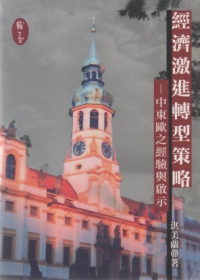|
|
|
經濟激進轉型策略:中東歐之經濟與啟示
|

|

沒有庫存
訂購需時10-14天
|
|
|
|

|
|
9789578639805 | |
|

|
|
洪美蘭 | |
|

|
|
翰蘆 | |
|

|
|
2002年7月01日
| |
|

|
|
127.00 元
| |
|

|
|
HK$ 114.3
|
|
|
|
|

| |
|
|
|
|
| |
|
|
詳
細
資
料
|
叢書系列:財經類
規格:平裝 / 417頁 / 16k / 普級 / 單色印刷 / 初版
出版地:台灣
財經類
|
|
分
類
|
專業/教科書/政府出版品 > 財經類 > 經濟 > 經濟史地 |
同
類
書
推
薦
|
|
|
其
他
讀
者
也
買
|
|
|
內
容
簡
介
|
1989年起,中東歐制度變遷式經濟轉型,在激進轉型策略的基本指導原則下,各國的經濟動態發展存有很多同質性與差異性,目前亦已奠立一個部份均衡的經濟環境。
經濟轉型極為複雜,任何理論均須配合國情有所修正。本書即以此作深入探討。
本書結合不涉及證是模型的研究方式,運用超邊際分析、政治經濟學、比較經濟學、國際經濟學來探討經濟激進轉型策略,並以中東歐國家為中心,從個案、理論,多面向分析、歸類,為理解中東歐及俄羅斯發展必讀的佳作。
報考俄羅斯或中東歐語系研究所,本書必讀。除此之外,產、官界對於中東歐認知、實務運用,本書更是必讀。
|
|
目
錄
|
第1篇 理論的探索
第1章 經濟轉型之意涵
1. 經濟轉型之定義
2. 市場導向經濟轉型之內涵
第2章 激進經濟轉型模式
1. 激進轉型模式之成型背景
2. 激進轉型模式之發展與爭議
3. 激進模式之轉型策略與理論
第2篇 中東歐國家經濟轉型之個案實證
第1章 總體經濟之「自由化」與「穩定化」
1. 經濟轉型先進國家
2. 新興主權國家
3. 其他巴爾幹半島國家
第2章 個體經濟之國營企業「私有化」
1. 以無償性自由分配模式為主之國家
2. 以有償性私有化模式為主之國家
第3篇 理論的多面向反思
第1章 中東歐國家經濟轉型之比較
第2章 中東歐國家經濟發展之現況與前景
第3章 結 論
參考文獻
|
|
序
|
自序
蘇聯(Soviet Union)總書記戈巴契夫(Mikhail Sergeevich Gorbachev)上台後所提出之重建(Perestroika)與開放(Glasnost)計劃,間接促使中東歐國家從1989年以來一連串的劇變,形成所謂的「蘇東波」效應 - 即中東歐國家、波羅的海三小國及獨立國協國家先後宣佈:其在政治上,放棄一黨專政,改以民主政體為主;在經濟上,放棄計畫經濟,而轉向以自由市場經濟為基礎之經濟制度。其轉型至今已經歷十多年之發展,西方國家對這些原社會主義國家轉型之議題相當重視,相關之研究與文獻不少。然而,台灣在此方面之研究卻相當貧乏,特別是有關經濟轉型方面,是一個尚待開發與須再加強探究之領域。
其次,就東歐國家之經濟版圖而言,自從這些國家實施經濟轉型,改採市場經濟後,就成為國際市場上的一片新生地,其商機不斷地湧現,各國皆虎勢瞻瞻地環視著這片大市場,特別是已開發國家和具有地緣優勢之其它歐洲國家。面對東歐市場應秉著「工欲善其事,必先利其器」的態度,就東歐的市場經濟狀況進行瞭解、分析,才能掌握其經濟脈動,進行更深一層的推動貿易往來與拓展經貿合作關係。
再者,由於中東歐國家這次的經濟變革是涉及到深層的制度變遷之經濟轉型,其中所牽動到的議題相當廣泛,其寶貴的經驗與教訓對任何一個面臨經濟發展困境的國家來說,都可獲得許多的啟發。特別是,對目前正處於經濟轉型階段的我國而言,更是相當重要而具有實質價值。譬如:台灣目前有關公營事業民營化的問題,即可從其中獲得學習之機會。因為,過去在共黨時期,中東歐國家在財產權公有的意識形態下認為,只要提高公營事業的經營效率,就不必進行私有化(privatization),也就可以維持社會主義經濟制度之基本特質。因而在財產公有的原則下,引進許多刺激經營效率的方法,但事後證明無論再怎樣提高公營事業的自主權,都無法改變生產效率低落問題,其根本原因在於:中央計劃與公營事業單位間的互動出現許多矛盾與問題,其中最大的問題即在於官僚(nomenklatura) 。反觀台灣,有學者指出:行政部門與民意機關間的往來充滿利益交換,而夾在當中的公營事業往往成為籌碼,因此,公營事業何來自主性?基於這種現實的考慮,他們支持公營事業民營化之立場,主張經由股權移轉落實私有化,以提高其經營效率。 這就與中東歐國家目前所面臨之私有化問題具有極高的同質性。因此,中東歐國家私有化之經驗,正可以觸發我們在民營化問題上更多的新思考。此外,不僅是在個體經濟之私有化方面,中東歐在經濟轉型過程中,其總體經濟政策的各種應用方式等等,其成功之經驗皆可作為我國學習之處,而其為轉型所付出之深刻代價亦可作為借鏡。
因此,基於兼顧學術與實用價值之需,本書除了探討經濟轉型之激進模式(revolutionary model)外,更將重點置於採行此模式之中東歐國家,深入淺出的瞭解其經濟轉型之歷程,並進一步的加以比較分析,以及探討其未來經濟轉型之發展前景。期盼經由此書的介紹,增進產、官、學界對中東歐國家之認知,以利其在實務上之具體運用,並增進我國在此領域方面之國際學術水準。
此書得以順利完稿出版,首先,要感謝許多學界之前輩、師長和家人,長期以來給予我之精神支持與鼓勵,其次,更要感謝我的研究生助理所提供之實質協助。僅以此書獻給我所敬愛之師長與家人,以表達我最深誠之謝意。
本書內容是多年來從事學術研究所獲得之部份研究成果的累積和集結,亦是近幾年來教書的心得結晶,同時也期望它是未來相關研究之濫殤。雖然筆者矢力以赴,對其寄予厚望,惟因個人學殖有限,疏漏之處,懇祈 學者先進不吝賜正,以匡不逮,是所至盼。
華沙(波蘭)貿易辦事處處長諾瓦茨基總代表序
Dear Prof. Lily Hung,
Your kind request that I write a few words to the valuable book of yours on the changes in Central and Eastern Europe is a great honor to me.
The great political and economic changes in Central and Eastern Europe which started in the beginning of the eighties, become the most important historical event which has influenced not only the history of Europe, but also had a counting global impact. In 1980, in Poland for the first time after the Second World War, communist authorities, facing the unprecedented spirit of mass opposition involving all groups of society, had to open dialog with the dissident forces, and agree to creation of the first in the Eastern Bloc free trade union – “Solidarity”.
This Trade Union, when it came into existence, became one of the strongest political powers inside Poland, gaining popularity, about which the Communist parties in the Central and East European countries could not even dream by that time. With gradual changes in the global balance of power, after almost ten years as a result of several discussions and compromises, time become ripe to conduct on the 4 June 1989, the first after WW II, free and democratic elections in the Eastern Bloc. In the popular vote, the former dissidents have won a majority of seats to the Parliament in Warsaw. This victory became a symbol and a milestone in dismantling the post - war order designed at the Yalta Conference.
Events in Poland have sparked a wave of resistance in other communist ruled countries. They created an inspiration for freedom movements across the Region - the “Velvet Revolution” in Prague, changes in Hungary and even the social unrest, which brought an end to the existence of the Berlin Wall - the most infamous monument of the Cold War. What is even more important, although the whole world was watching with great attention and fears the process of democratization in those countries, all the forces involved have shown constraint, will of conducting dialogue, and wisdom. All this has enabled peaceful process of transformation, and in this part of the World, where during the Cold War forces of NATO and Warsaw Pact were facing each other directly; new order came to life in a fully peaceful and civilized manner.
With enthusiasm for freedom and independence the new situation has also produced enormous tasks for the new democracies. After years of so-called “socialist planned economy”, the newly created governments have inherited backward and outdated factories, inefficient agriculture, lack of realistic currency policy, inflation, neglected infrastructure etc. Till now in Central and Eastern Europe it took 13 years of enormous work, changes, reforms and adjustments to bring the economies to a growth.
Even more important was gaining of political security by the new democracies. This process is still not finished. After the first phase of expansion of the North Atlantic Treaty Organization, in which Poland, the Czech Republic and Hungary were accepted, the next enlargement is underway that will include even more countries of the Region. Membership in NATO is crucial not only as a deterrent to the external threats, but must be also seen as an important instrument securing the free and democratic systems in the countries, which enter the Treaty.
Another kind of substantial change for which the countries of Central and Eastern Europe are now struggling is the economic security. This can be achieved with the expansion of European Union, which hopefully will materialize in the beginning of 2004, and should include 10 new member states - among them Poland. Entering the European Union for these countries of Central and Eastern Europe will be not only an important event from the point of view of economy of those states. It will also symbolize the full final return of the 10 countries to the European Civilization, where their statehood has its historical roots.
Bearing all this in mind, especially the peaceful character of changes in the part of Europe where Poland is located, I am fully convinced, that research and study of the changes in Central and Eastern Europe is a very important task. I find the book by Prof. Hung Mei-lan a very important contribution to this task.
With assurances of my highest consideration
Tomasz Nowacki
DIRECTOR – GENERAL OF THE
WARSAW (POLAND) TRADE OFFICE IN TAIPEI
|
|
|
書
評
|
|
|
|

